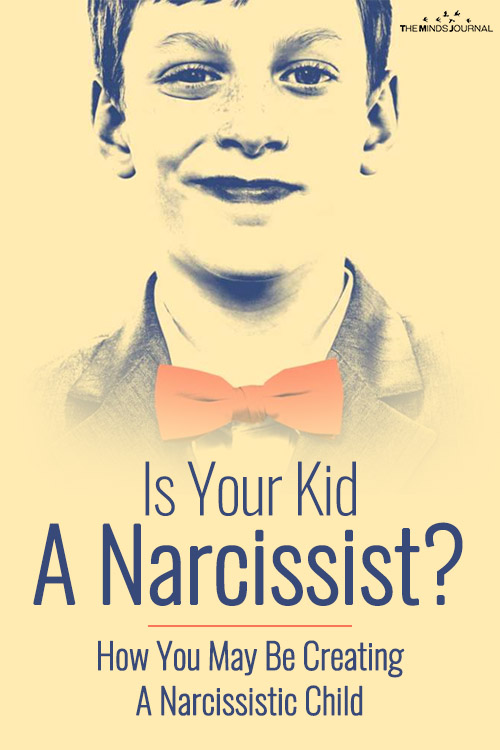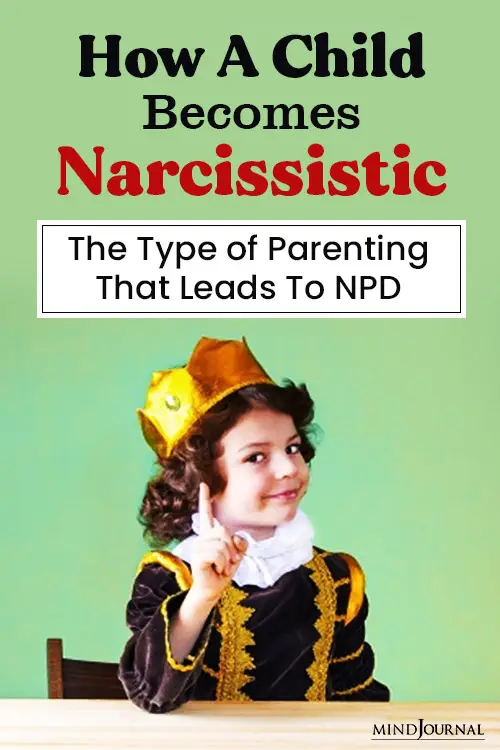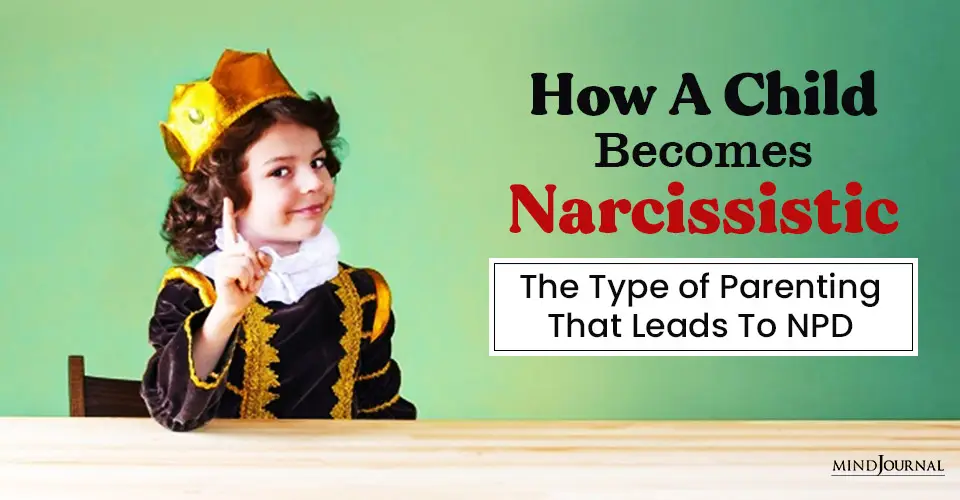Although psychologists are still trying to figure out what makes narcissistic children, they believe parental behavior is a major contributing factor. If during the developmental stage you overvalue your child and affirm that they are better than others who deserve special treatment, then you are encouraging them to grow up to be a narcissist.
How Does a Child Become a Narcissist?
What type of parenting leads children to grow up with a NPD?
By Dr. Elinor Greenberg
I am often asked, “What type of parenting leads children to grow up with a Narcissistic Personality Disorder?” Or “Are the children of Narcissistic parents at risk of becoming Narcissists themselves?” Today’s post may shed some light on this issue.
How Does Someone “Get” a Narcissistic Personality Disorder?
Narcissistic Personality Disorders are a byproduct of certain childhood family environments. All children want their parents’ approval and attention. Children adapt to their homes, and often the most productive and reasonable adaptation to some home situations is to become a Narcissist.
Below are some common scenarios that can contribute to the creation of Narcissistic children
Scenario 1— Narcissistic Parental Values
In this situation, the child is raised in a family that is very competitive and only rewards high achievement. One or both of the parents are Exhibitionist Narcissists. The family motto is: If you can’t be the best, why bother?
Love is conditional: When you come in first in the race, win the science fair or star in the school show, you are showered with praise and attention. When you do not, you are a disappointment. Everyone in the family is supposed to be special and prove it over and over again. No matter how much you achieve, the pressure is never off. As one woman said: “When I came home with a report card with all A’s, my father asked me if anyone got an A+.”
Children in these families do not feel stably loved. It is hard for them to enjoy anything for its own sake if it does not confer status. Instead of being supported by their parents to explore what they like and want to do more of, they only receive support for high achievement.
Their parents are not interested in their children’s “real selves,” they are mainly interested in how their children can make the family look good. They want to be able to brag to their neighbors: “Look at what my kid did!”
The children who grow up in homes like this only feel secure and worthwhile when they are successful and recognized as the “best.” The conditional love of their childhood and the over-evaluation of high status and success in their home sets in motion a lifelong pattern of chasing success and confusing it with happiness.
Read This is how parents create narcissistic children
Example: John and his Life on Paper
John, a brilliant and successful man with a Narcissistic Personality Disorder, told me that he was coming to therapy because he knew that had lost his way. Nothing he did seemed to have any real meaning for him.
He said, “I have a ‘resume’ life. Everything about me looks good on paper. Even my hobbies are cool. But somewhere along the way, I lost touch with who I really am. I no longer feel much genuine pleasure in my accomplishments. I started out enjoying what I do well, but now I do it only because it impresses other people. Inside I feel empty.”
Scenario 2: The Devaluing Narcissistic Parent
In this scenario, there is a very domineering and devaluing parent who is always putting down the child. The parent is generally irritable, easily angered, and has unrealistically high expectations.
If there are two or more children, the parent will praise one and devalue the others. The “good one” can quickly become the “bad one” and suddenly a different sibling is elevated. Nobody in the family feels secure and everyone spends their time trying to pacify the explosive Narcissistic parent.
The other parent is often treated exactly like the children and belittled as well. When he or she disagrees with the Narcissistic parent, they too are devalued.
Children who grow up in these households feel angry, humiliated, and inadequate. They are likely to react to their childhood situations in a few different ways.
The Defeated Child:
Some of these children simply give up and accept defeat. In their teenage years, after decades of being told that they are worthless, they may spiral down into a self-hating shame-based depression. Then to escape their inner shame, they may try to lose themselves in impulsive, addictive behaviors. Some become alcoholics and drug addicts, others spend their days on the internet. They never achieve their potential because they have been convinced that they have none.
The Rebellious Child:
These children overtly reject their parents’ message that they are “losers.” Instead, they spend their life trying to prove to themselves, the world, and the devaluing parent that they are special and their parents were wrong. They pursue achievement in every way that they can. Proving they are special becomes a lifelong mission, while underneath there is always a harsh inner voice criticizing their every mistake—no matter how minor.
Read 4 Types Of Parenting Styles In Psychology: What Kind Of A Parent Are You?
The Angry Child:
These children grow up furious at the devaluing parent. Anyone who reminds them of their parents in any way becomes the target of their anger. They sometimes become Toxic or Malignant Narcissists themselves. It is not enough for them to achieve, they must destroy as well.
Example: “Pretty Woman”
In this movie, Richard Gere portrays a wealthy businessman who buys and breaks up companies. He enjoys destroying the life’s work of the former owners of these companies because all of them are symbolic substitutes for his hated father. The movie turns into a Cinderella story after he hires a prostitute (Julia Roberts) with whom he eventually falls in love. Even his choice of a love object is typically Narcissistic. I have met many wealthy Narcissistic men who can only show love to women that they “save” who are safely below them in status.
Scenario 3: The Golden Child
These parents are usually closet Narcissists who are uncomfortable in the spotlight. Instead, they brag about their extremely talented child. Often the child is very talented and deserves praise, but these parents sometimes take it to ridiculous lengths. This type of excessive idealization of a child as flawless and special can lead to the child having a Narcissistic adaptation in later life.
Read The Golden Child: How They Are Created In A Narcissistic Family
The Effects of Conditional vs. Unconditional Love
Everyone wants to be seen realistically and loved unconditionally. If children believe that their parents only value them because they are special, this can contribute to underlying insecurity. No one wins all the time. No one is better than everyone else in every way.
Children who are idealized by a parent can begin to believe that they are only lovable when they are perfect and worthy of idealization.
The Perception of Flaws and Shame
When parents idealize their children, the children may become ashamed when they see any flaws in themselves. This can lead them to keep striving for perfection and proof that they are flawless and worth idealizing.
Stunted Development of the Real Self
In this process, children may lose touch with their real selves and real likes and dislikes. Instead of exploring who they really are and where their true interests and talents lie, they can get off track entirely and spend their time only doing things that they are already good at and they think will get their parents’ approval.
The Result: Too much parental idealization may lead to an unbalanced view of the self. When this happens, the child then perceives any flaws as unacceptable and strives to be seen as perfect. It is a short hop, skip, and a jump from this to full-blown Narcissism
Occasionally, these children resist their role as “The Golden Child,” do not become Narcissistic, and are embarrassed by the excessive praise that they receive. They feel burdened by the role that they are asked to play in the family. One mother told me: “My son is the flagship of the family who will lead us all to greatness.” Her son told me: “I just want to get off this endless treadmill and live my own life without having to meet my parents’ crazy expectations.”
Scenario 4: The Exhibitionist’s Admirer
Some children grow up in a Narcissistic household where there is an Exhibitionist Narcissist parent who rewards them with praise and attention as long as they admire and stay subservient to the parent. These children are taught Narcissistic values but are discouraged from exhibiting themselves for admiration. Instead, their role in the family is to uncritically worship the greatness of their Narcissistic parent without ever trying to equal or surpass that parent’s achievements.
This is an excellent way to create Covert or Closet Narcissists. The children learn that they will be given Narcissistic supplies—attention and praise—for not openly competing with the Narcissistic parent and that these supplies will be withheld and they will be devalued if they openly try to get acknowledged as special. All their value in the family comes from acting as a support to the ego of the Exhibitionist parent.
In adulthood, these children feel too exposed and vulnerable to be comfortable in the spotlight, so their Narcissism and self-esteem issues are less obvious to anyone who does not know them well. Some adapt to this role very well and lead productive lives in a job that involves supporting a high achieving Exhibitionist Narcissist whom they admire.
Read 10 Simple Steps to Stop Toxic Parenting
Example: Cindi and the “Great Man”
Cindi was the personal assistant of the CEO of her company. She admired him and lived to serve him. She felt special through association with him. She treasured any small bits of praise that she had received over the years from him and kept all the holiday and birthday cards he had given her. Cindi never married because she was so focused on her job and had Narcissistic values herself. Whenever she met men who wanted to date her, they always seemed lacking compared to her boss. As she explained to one of her girlfriends, “After working so closely with my boss, other men just seem too inferior to bother with.”
Punchline: Once you know what to look for, it is easy to see how certain childhood home environments support Narcissistic adaptations by the children. In some homes, becoming a Narcissist is often the only sane solution.
Written by Elinor Greenberg, Ph.D.
Originally appeared in Psychology Today










Leave a Reply
You must be logged in to post a comment.